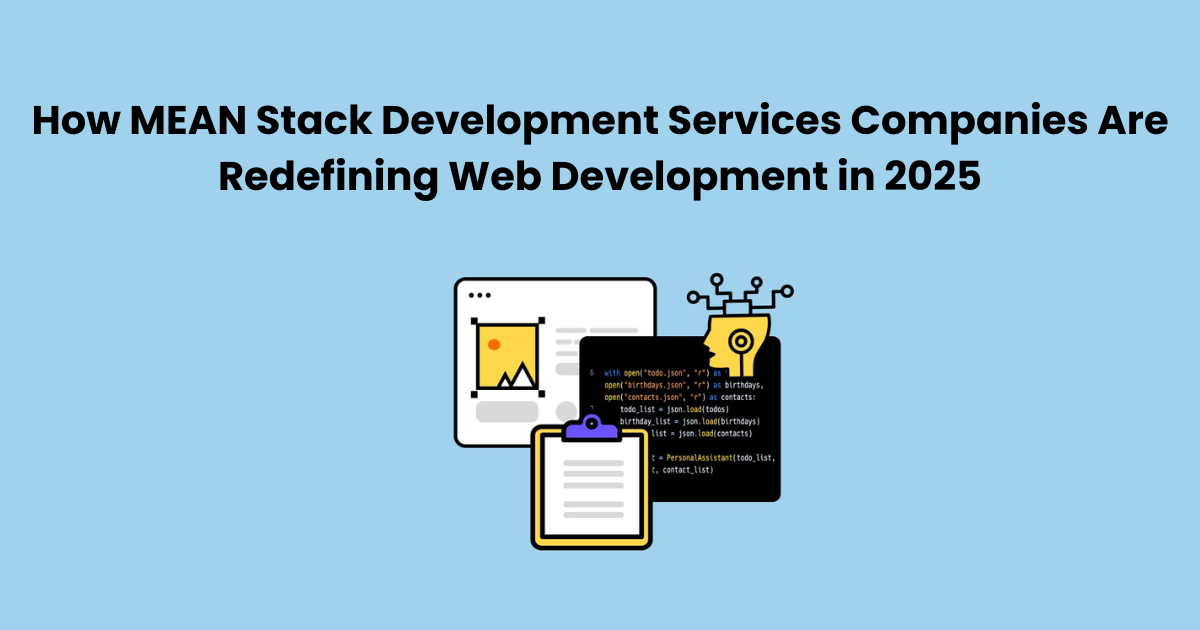As digital transformation becomes a business imperative in 2025, companies are seeking reliable, scalable, and efficient ways to build high-performing web applications. At the heart of this transformation lies the MEAN Stack, a powerful JavaScript-based technology stack.
MEAN Stack Development Services companies have emerged as key players in this space, offering end-to-end solutions that support rapid development, reduce time-to-market, and enhance user experiences.
- 78% of startups prefer JavaScript-based full-stack solutions in 2025
- 65% of enterprise-grade applications are built using MEAN or MERN
- 47% cost savings observed when using MEAN Stack compared to traditional stacks
- 2.5x faster development cycles using MEAN Stack Development Services
- 92% satisfaction rate among businesses working with MEAN Stack developers
What Is MEAN Stack?
MEAN Stack is a popular open-source JavaScript software stack used for building dynamic, responsive, and full-featured web applications. The term “MEAN” is an acronym that represents the four core technologies involved in this stack:
1. MongoDB
A NoSQL database that stores data in a flexible, JSON-like format called BSON. It allows developers to create scalable and schema-less data models, making it ideal for modern applications that require flexibility in how data is structured and queried.
2. Express.js
A minimalist and efficient web application framework for Node.js. Express simplifies the process of building server-side logic, handling HTTP requests and responses, managing middleware, and creating APIs, thus forming the backbone of the application’s server-side logic.
3. Angular
A powerful front-end framework developed and maintained by Google. Angular enables the development of highly interactive single-page applications (SPAs) through features such as two-way data binding, dependency injection, modularization, and component-based architecture.
4. Node.js
A server-side runtime environment that allows JavaScript to be executed outside the browser. It is built on Google’s V8 engine and is known for its event-driven, non-blocking I/O model, which makes it lightweight and efficient for building scalable network applications.
Evolution of Web Development: The Shift Towards Full-Stack JavaScript
Traditionally, developers needed to switch between multiple programming languages and frameworks for front-end and back-end tasks. This led to complexities in development cycles, communication gaps, and integration hurdles.
With the rise of JavaScript as a universal language, MEAN Stack Development Services enabled:
- Unified Development Teams: A single language across the stack allows front-end and back-end developers to collaborate seamlessly, reducing communication gaps and boosting efficiency.
- Faster Prototyping: Rapid development with reusable components and real-time testing helps businesses bring MVPs to market faster.
- Reduced Development Costs: Smaller, more flexible teams and the use of open-source technologies lower overall development expenses.
- Improved Maintenance: A unified codebase simplifies debugging, updates, and long-term scalability.
This shift has led to a boom in demand for MEAN Stack Development Services Companies that can build cohesive, high-performance applications using one unified language.
Role of MEAN Stack Development Services in 2025
In 2025, MEAN Stack Development Services Companies have become innovation enablers. They’re not just coding partners; they’re strategic collaborators driving digital success.
Key contributions include:
- Scalable, Enterprise-Grade Application Development: MEAN enables the creation of robust, high-performance applications that can handle large-scale traffic and complex data operations, making it ideal for growing businesses and enterprise environments.
- End-to-End Development and Expert Consulting: From project planning and UI/UX design to backend logic and deployment, MEAN Stack service providers offer complete, full-stack development with strategic consultation tailored to client goals.
- Cloud-Native, Containerized Deployments: Leveraging Node.js and Docker, MEAN applications can be built as cloud-native and containerized microservices, ensuring flexibility, portability, and easy scalability in modern DevOps environments.
- Microservices-Based Architecture with MEAN Components: By adopting modular and loosely coupled microservices architecture, MEAN Stack improves application agility, simplifies maintenance, and enhances deployment pipelines across distributed systems.
- Cross-Platform Web and Mobile Solutions: MEAN Stack enables seamless development of responsive web apps and hybrid mobile apps, ensuring consistent user experiences across multiple platforms and devices.
Core Technologies in MEAN Stack and Their Contributions
The MEAN Stack is built on four powerful technologies—MongoDB, Express.js, Angular, and Node.js—each playing a distinct role in delivering a seamless full-stack development experience. Together, they create a unified ecosystem that supports fast, scalable, and maintainable applications.
MongoDB: The Backbone of Data Storage
MongoDB is a NoSQL database designed to store data in a JSON-like format (BSON). It enables highly flexible and scalable data architecture.
- Flexible schema design allows developers to store diverse data structures without rigid table formats.
- High availability and scalability are ensured through built-in replication and sharding mechanisms.
- Fast querying is supported with native JSON-style document formats, simplifying data access and manipulation.
Express.js: The Web Application Framework
Express.js is a minimal and flexible Node.js framework used to build robust backend applications and APIs.
- Minimalist and unopinionated design gives developers the freedom to structure applications as needed.
- Efficient request handling manages HTTP requests and middleware operations smoothly.
- Simplifies route management, making backend logic and API routing clear and maintainable.
Angular: The Front-End Powerhouse
Angular is a client-side framework developed by Google, designed for creating dynamic and interactive single-page applications (SPAs).
- Component-based architecture enhances modularity and reusability of UI elements.
- Real-time DOM manipulation enables seamless updates to the view based on user interactions.
- Advanced templating and data binding simplify the connection between data models and the user interface.
Node.js: Server-Side Execution
Node.js is a runtime environment that executes JavaScript on the server side, enabling full-stack JavaScript development.
- Event-driven, non-blocking I/O model allows high-performance and scalable application behavior.
- Handles thousands of concurrent connections efficiently, making it ideal for real-time applications.
- Uses npm (Node Package Manager) for rich module support, giving access to thousands of reusable packages.
Benefits of Hiring a MEAN Stack Development Services Company
MEAN Stack Development Services offer a comprehensive set of advantages that cater to the fast-paced, scalable, and cost-effective demands of modern businesses. Below are key benefits, each contributing to a more streamlined and high-performing development lifecycle.
Unified Codebase
The MEAN stack uses JavaScript across the entire technology stack, eliminating the need to switch between different programming languages for frontend, backend, and database operations.
- Reduces context switching between technologies, which improves development speed and code consistency.
- Enhances team productivity and collaboration by allowing developers to work seamlessly across all layers of the application.
- Promotes a single-source-of-truth approach, leading to better maintainability and fewer integration errors.
Faster Time-to-Market
With its modular and component-based structure, the MEAN stack supports rapid development cycles.
- Reusable components save time on repeated tasks and allow quick customization.
- Modular architecture enables faster debugging, feature additions, and maintenance.
- Aligned with agile methodologies, MEAN accelerates prototyping, testing, and deployment—essential for startups and evolving enterprises.
Scalability and Flexibility
MEAN Stack is designed to accommodate both small-scale MVPs and enterprise-level applications.
- Easily handles a growing user base without requiring fundamental changes to architecture.
- Supports both horizontal scaling (adding more machines) and vertical scaling (upgrading system resources), ensuring the solution grows with business needs.
- Ideal for applications requiring real-time capabilities, such as chat apps, dashboards, and data visualization tools.
Cost-Efficiency
MEAN Stack is built entirely on open-source technologies, significantly reducing financial barriers.
- Reduces development hours due to a streamlined and consistent workflow.
- No licensing fees—MongoDB, Express.js, Angular, and Node.js are all open-source with vibrant community support.
- Lowers maintenance and infrastructure costs, especially when combined with cloud-native solutions.
End-to-End Solutions
MEAN Stack Development Services provide full-cycle capabilities—from frontend design to backend operations and cloud deployment.
- UI/UX design: Angular facilitates the creation of rich, user-friendly interfaces.
- Backend integration: Express.js and Node.js ensure seamless business logic implementation and secure server-side operations.
- API development: RESTful and GraphQL APIs can be quickly built and consumed across different devices.
- Cloud deployment: MEAN applications can be deployed in scalable environments using platforms like AWS, Azure, or Google Cloud.
How MEAN Stack Development Companies Ensure Scalable Web Solutions
Scalability is a core requirement for modern web applications, especially those that must adapt to increasing user demand, evolving features, and diverse deployment environments. MEAN Stack Development Companies adopt advanced architectural patterns, cloud-native tools, and performance optimization techniques to ensure robust, future-ready solutions. Here’s how they do it:
Using Microservices Architecture
One of the most effective strategies for building scalable applications is breaking down monolithic systems into microservices.
- Decomposes applications into manageable services: Each feature or module is developed, deployed, and scaled independently.
- Enhances maintainability and scalability: Smaller, focused services are easier to update, test, and expand, reducing the risk of system-wide failures.
Cloud Integration
Scalable applications require dynamic infrastructure, which is made possible through cloud services and containerization.
- Deploying apps on AWS, Azure, or GCP: These cloud platforms offer auto-scaling, high availability, and global content delivery.
- Leveraging containerization via Docker and Kubernetes: Containers encapsulate each microservice with its dependencies, enabling rapid deployment, version control, and scaling. Kubernetes automates orchestration, load balancing, and resource allocation.
Performance Optimization
To scale effectively, applications must also be optimized at the code and data layer. MEAN Stack companies employ several performance-enhancing techniques:
- Lazy loading in Angular: Loads components and modules only when needed, improving initial load time and user experience.
- Efficient query design in MongoDB: Indexing, aggregation pipelines, and denormalized data structures ensure fast access to large datasets.
- Load balancing with Node.js clusters: Distributes incoming requests across multiple server instances, maximizing CPU utilization and improving throughput.
Industry Applications of MEAN Stack Development
MEAN Stack Development Services are increasingly being adopted across diverse industries due to their scalability, flexibility, and performance capabilities. Below are some key industry applications where MEAN Stack plays a pivotal role in creating efficient and innovative solutions:
E-commerce Platforms
MEAN Stack is highly effective for developing modern, scalable e-commerce platforms that require real-time updates, seamless payment processing, and efficient user management.
- Real-time inventory updates: With Node.js and MongoDB, e-commerce platforms can provide instant inventory updates, ensuring that product availability is always accurate and up-to-date.
- Seamless checkout experiences: Angular’s ability to manage dynamic content, combined with Express.js for secure backend processing, enables a smooth and fast checkout process, improving customer satisfaction and reducing cart abandonment.
Healthcare Systems
In the healthcare industry, data security and compliance are paramount. MEAN Stack ensures secure, scalable, and user-friendly applications for healthcare providers.
- Secure patient data management: MongoDB’s flexible schema and Node.js’s real-time capabilities are ideal for managing sensitive patient data in a secure and scalable environment.
- HIPAA-compliant web applications: MEAN Stack technologies can be customized to ensure compliance with regulations like HIPAA, ensuring the secure exchange and storage of patient data across the system.
Education Portals
Educational institutions and e-learning platforms benefit from MEAN Stack’s versatility in creating interactive, user-friendly, and real-time educational tools.
- Interactive learning management systems: Angular facilitates the creation of engaging, dynamic interfaces for students and instructors, making learning more interactive and enjoyable.
- Video conferencing and quiz modules: Real-time communication and collaborative features, such as video conferencing and quizzes, can be seamlessly integrated into the portal using Node.js and Express.js for backend services.
FinTech Applications
The financial technology industry requires secure, real-time systems capable of processing high volumes of transactions efficiently. MEAN Stack provides the perfect tools for building such solutions.
- Real-time transaction monitoring: Node.js enables real-time data processing, allowing instant transaction updates, fraud detection, and activity monitoring.
- Integrated APIs for payment gateways: MEAN Stack simplifies the integration of payment APIs, enabling secure and seamless payment processing in FinTech applications.
Custom Solutions Offered by MEAN Stack Development Services Companies
MEAN Stack Development Services provide tailored solutions to meet specific business needs, ensuring scalability, security, and future-readiness. Key offerings include:
- Progressive Web Apps (PWAs): Fast, reliable web apps that offer native app-like experiences on any device.
- Enterprise Resource Planning (ERP) Solutions: Integrated systems to manage core business processes, from inventory to finance.
- Customer Relationship Management (CRM) Software: Custom solutions for managing customer interactions, improving sales, and automating marketing.
- Single Page Applications (SPAs): Dynamic, fast-loading web apps offering a seamless user experience.
- API-First Platforms: APIs that enable integration with external systems and provide flexibility for future enhancements.
- AI and Chatbot Integrations: Intelligent automation for enhancing customer service and operational efficiency.
These services are customized according to business objectives, ensuring that every solution is tailored, secure, and future-ready.
Challenges Addressed by MEAN Stack in Modern Web Development
MEAN Stack effectively tackles several common challenges faced in modern web development, providing robust solutions through its integrated technologies. Here’s how it addresses key issues:
Problem: Backend and Frontend Inconsistencies
- Solution: JavaScript unification across both the frontend and backend ensures consistency in code, reducing compatibility issues and simplifying development and maintenance.
Problem: Difficult Deployment Process
- Solution: Node.js streamlines server-side rendering and deployment, allowing for efficient deployment cycles and reducing the complexity often associated with setting up and managing server infrastructure.
Problem: Inefficient Data Handling
- Solution: MongoDB, as a flexible and scalable NoSQL database, provides efficient data storage and retrieval, especially for applications with dynamic or unstructured data, improving speed and scalability.
Problem: Performance Bottlenecks
- Solution: Node.js’s non-blocking, event-driven architecture significantly boosts performance, especially in handling high-volume, real-time applications, by allowing multiple requests to be processed simultaneously without delays.
Future Trends in MEAN Stack Development
The MEAN Stack is continuously evolving, adapting to new technologies and market demands. Here are some key future trends that will shape its development:
AI Integration
- Trend: Adding machine learning components into MEAN applications.
- Impact: Integrating AI allows MEAN applications to offer personalized user experiences, predictive analytics, and smarter decision-making processes.
IoT Compatibility
- Trend: Using MEAN with real-time data from connected devices.
- Impact: MEAN Stack is well-suited for processing and visualizing data from IoT devices, enabling real-time updates, automation, and smarter solutions.
Serverless Architecture
- Trend: Moving toward Functions-as-a-Service (FaaS).
- Impact: Serverless computing reduces overhead and simplifies scaling by allowing developers to focus on writing individual functions instead of managing servers, enhancing cost efficiency and flexibility.
Enhanced Security
- Trend: Implementing JWT, OAuth2.0, and multi-factor authentication.
- Impact: These security protocols will become integral in ensuring robust, secure access control and protection of sensitive data, which is crucial as web applications grow more complex.
Conclusion
The role of MEAN Stack Development Services Companies in 2025 has evolved from mere developers to full-scale digital partners. With the ability to build robust, scalable, and real-time applications, they are at the forefront of innovation in web development. Businesses that align with these companies gain a competitive advantage through reduced development time, cost-efficiency, and future-proof architecture.
Whether you’re a startup looking to launch an MVP or an enterprise modernizing your web infrastructure, MEAN Stack Development Services offer the agility and strength your digital roadmap needs.













Leave a Reply